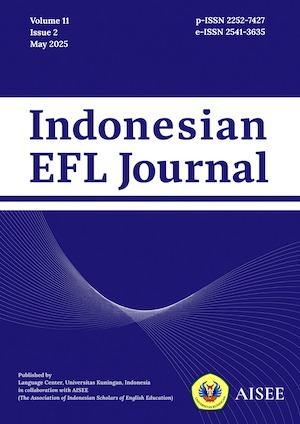THE POTENTIAL IMPACT OF USING CHAT GPT ON EFL STUDENTS' WRITING: EFL TEACHERS' PERSPECTIVE
Abstract
Chat GPT is currently gaining significant attention worldwide, including in writing. Extensive research has been conducted of writing in higher education. Many students are also utilizing Chat GPT as a new technology tool. With advances in technology, tools like Chat GPT that utilize artificial intelligence (AI) can help overcome difficulties with academic writing. However, there is known about how teachers view Chat GPT as a digital tool for English writing. The study investigates teacher perspective on using Chat GPT as a tool to support English writing, using qualitative case study approach. 10 teachers familiar with Chat participated. Questionnaires and in-depth interviews collected data on participants' viewpoints. Findings showed teachers responded positively overall to using Chat GPT to help improve students writing quality. Additionally, Chat GPT was providing useful writing features, and aiding language development. This study suggests AI technologies like Chat GPT play an important role in facilitating high-quality student academic writing.References
Abu Muna Almaududi Ausat , Suherlan, H. K. A. (2022). Is ChatGPT Dangerous for Lecturer Profession? An In-depth Analysis. Jurnal Pendidikan Dan Konseling, 4, 1349–1358.
Braun, V., & Clarke, V. (2006). Using thematic analysis in psychology; In qualittaive research in psychology. Uwe Bristol, 3(2), 77–101. https://psychology.ukzn.ac.za/?mdocs-file=1176
Chasan-Taber, L. (2014). Study Design and Methods. Writing Dissertation and Grant Proposals, 153–178. https://doi.org/10.1201/b16851-12
Doroudi, S. (2023). The Intertwined Histories of Artificial Intelligence and Education. In International Journal of Artificial Intelligence in Education (Vol. 33, Issue 4). Springer New York. https://doi.org/10.1007/s40593-022-00313-2
Farrokhnia, M., Banihashem, S. K., Noroozi, O., & Wals, A. (2023). A SWOT analysis of ChatGPT: Implications for educational practice and research. Innovations in Education and Teaching International, 00(00), 1–15. https://doi.org/10.1080/14703297.2023.2195846
Fithriani, R. (2021). The utilization of mobile-assisted gamification for vocabulary learning: Its efficacy and perceived benefits. Call-Ej, 22(3), 146–163.
Hosseini, M., Rasmussen, L. M., & Resnik, D. B. (2023). Using AI to write scholarly publications. Accountability in Research, 00(00), 1–9. https://doi.org/10.1080/08989621.2023.2168535
Hutson, M. (2023). the Use of Artificial Intelligence-Based Chat-Gpt and Its Challenges for the World of Education; From the Viewpoint of the Development of Creative Writing Skills. Proceeding of International Conference on Education, Society and Humanity, 1(1), 353–357. https://ejournal.unuja.ac.id/index.php/icesh/article/view/5614
Klamma, R., Chatti, M. A., Duval, E., Hummel, H., Hvannberg, E. T., Kravcik, M., Law, E., Naeve, A., & Scott, P. (2007). Social software for life-long learning. Educational Technology and Society, 10(3), 72–83.
Mandernach, B. J. (2009). Effect of instructor-personalized multimedia in the online classroom. International Review of Research in Open and Distance Learning, 10(3), 1–19. https://doi.org/10.19173/irrodl.v10i3.606
Marzuki, Widiati, U., Rusdin, D., Darwin, & Indrawati, I. (2023). The impact of AI writing tools on the content and organization of students’ writing: EFL teachers’ perspective. Cogent Education, 10(2). https://doi.org/10.1080/2331186X.2023.2236469
Mhlanga, D. (2023). Open AI in Education, the Responsible and Ethical Use of ChatGPT Towards Lifelong Learning. SSRN Electronic Journal. https://doi.org/10.2139/ssrn.4354422
Murcahyanto, H. (2023). Penerapan Media Chat GPT pada Pembelajaran Manajemen Pendidikan terhadap Kemandirian Mahasiswa. Edumatic: Jurnal Pendidikan Informatika, 7(1), 115–122. https://doi.org/10.29408/edumatic.v7i1.14073
Qadir, J. (2023). Engineering Education in the Era of ChatGPT: Promise and Pitfalls of Generative AI for Education. IEEE Global Engineering Education Conference, EDUCON, 2023-May. https://doi.org/10.1109/EDUCON54358.2023.10125121
Roll, I., & Wylie, R. (2016). Evolution and Revolution in Artificial Intelligence in Education. International Journal of Artificial Intelligence in Education, 26(2), 582–599. https://doi.org/10.1007/s40593-016-0110-3
Rudolph, J., Tan, S., & Tan, S. (2023). ChatGPT: Bullshit spewer or the end of traditional assessments in higher education? Journal of Applied Learning and Teaching, 6(1), 342–363. https://doi.org/10.37074/jalt.2023.6.1.9
Sheen, J. (2011). International Conference of Education, Research and Innovation. Australasian Journal of Paramedicine, 9(1), 61–66.
Skrynnyk, O., Lyeonov, S., Lenska, S., Litvinchuk, S., Galaieva, L., & Radkevych, O. (2022). Artificial Intelligence in Solving Educational Problems. Journal of Information Technology Management, 14, 132–146. https://doi.org/10.22059/JITM.2022.88893
Styati, E. W., & Irawati, L. (2020). The Effect of Graphic Organizers on ELT Students’ Writing Quality. Indonesian Journal of EFL and Linguistics, 5(2), 279. https://doi.org/10.21462/ijefl.v5i2.283
Tri Julianto, I., Kurniadi, D., Septiana, Y., & Sutedi, A. (2023). Alternative Text Pre-Processing using Chat GPT Open AI. Jurnal Nasional Pendidikan Teknik Informatika (JANAPATI), 12(1), 67–77. https://doi.org/10.23887/janapati.v12i1.59746









